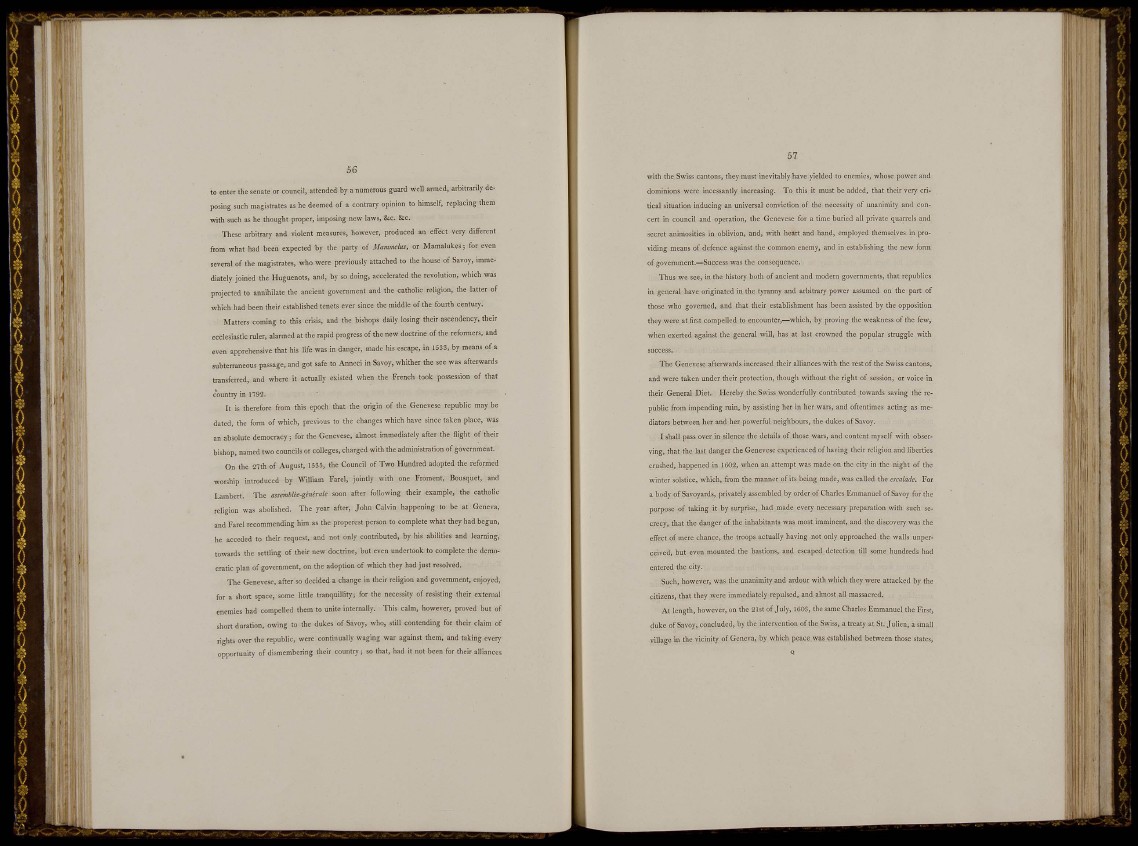
n
' i; 1
to enter the senate or council, attended by a numerous guard well armed, arbitrarily deposing
such magistrates as he deemed of a contrary opinion to himself, replacing them
with such as he thought proper, imposing new laws, &c. &C.
These arbitrary and violent measures, however, produced an effect very different
from what had been expected by the party of ^fa7nme¡us, or Mamaluk.es 5 for even
several of the magistrates, who were previously attached to the house of Savoy, immediately
joined the Huguenots, and, by so doing, accelerated the revolution, which was
projected to annihilate the ancient government and the catholic religion, the latter of
which had been their established tenets ever since the middle of the fourth century.
Matters coming to this crisis, and the bishops daily losing their ascendency, their
ecclesiastic ruler, alarmed at the rapid progress of the new doctrine of the reformers, and
even apprehensive that his life was in danger, made his escape, in 1533, by means of a
subterraneous passage, and got safe to Anneci in Savoy, whi ther the see was afterwards
transferred, and where it actually existed when the French took possession of that
country in 1792.
I t is therefore from this epoch that the origin of the Genevese republic may be
dated, the form of which, previous to the changes which have since taken place, was
an absolute democracy; for the Genevese, almost immediately after the flight of their
bishop, named two councils or colleges, charged with the administration of government.
On the 27th of August, 1535, the Council of Two Hundred adopted the reformed
worship introduced by William Farel, jointly with one Froment, Bousquet, and
Lambert. The assembUe-ghieraU soon after following their example, the catholic
religion was abolished. The year after, John Calvin happening to be at Geneva,
and Farel recommending him as the properest person to complete what they had begun,
he acceded to their request, and not only contributed, by his abilities and learning,
towards the settling of their new doctrine, but even undertook to complete the democratic
plan of government, on the adoption of which they had just resolved.
The Genevese, after so decided a change in their religion and government, enjoyed,
for a short space, some little tranquillity; for the necessity of resisting their external
enemies had compelled them to unite internally. This calm, however, proved but of
short duration, owing to the dukes of Savoy, who, still contending for their claim of
rights over the republic, were continually waging war against them, and taking every
opportunity of dismembering tlieir country ; so that, had it not been for their alliances
with the Swiss cantons, they must inevitably have yielded to enemies, whose power and
dominions were incessantly increasing. To this it must be added, that their very critical
situation inducing an universal conviction of the necessity of unanimity and concert
in council and operation, the Genevese for a time buried all private quarrels and
secret animosities in oblivion, arid, with heart and hand, employed themselves in providing
means of defence against the common enemy, and in establishing the new form
of government.—Success was the consequence.
Thus we see, in the history both of ancient and modern governments, that republics
in general have originated in the tyranny and arbitrary power assumed on the part of
those who governed, and that their establishment has been assisted by the opposition
they were at first compelled to encounter,—which, by proving the weakness of the few,
when exerted against the general will, has at last crowned the popular struggle with
success.
The Genevese afterwards increased their alliances wi th the rest of the Swiss cantons,
and were taken under their protection, though without the right of session, or voice in
their General Diet. Hereby the Swiss wonderfully contributed towards saving the republic
from impending ruin, by assisting her in her wars, and oftentimes acting as mediators
between her and her powerful neighbours, the dukes of Savoy.
I shall pass over in silence the details of those wars, and contcnt myself with observing,
that the last danger the Genevese experienced of having their religion and liberties
crushed, happened in 1602, when an attempt was made on the city in the night of the
winter solstice, which, from the manner of its being made, was called the cscaladc. For
a body of Savoyards, privately assembled by order of Charles Emmanuel of Savoy for the
purpose of taking it by surprise, had made every necessary preparation with such secrecy,
that the danger of the inhabitants was most imminent, and the discovery was the
effect of mere chance, the troops actually having not only approached tlie walls unperceived,
but even mounted the bastions, and escaped detection till some hundreds had
entered the city.
Such, however, was the unanimity and ardour with which they were attacked by the
citizens, that they were immediately repulsed, and almost all massacred.
At length, however, on the 21st of July, 1603, the same Charles Emmanuel the First,
duke of Savoy, concluded, by the intervention of the Swiss, a treaty at St. Jul ien, a small
village in the vicinity of Geneva, by which peace was established between those states.